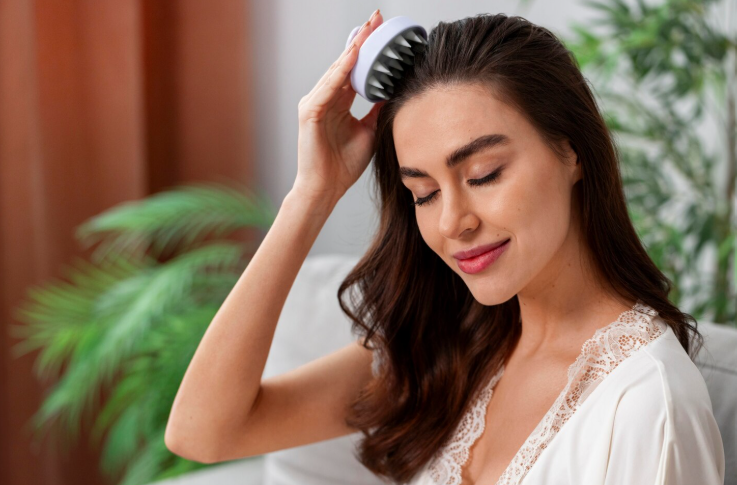Hair loss has become one of the most common beauty concerns all over the world. It affects both men and women, from teenage years to middle age. While genetics, stress, pollution, and nutritional gaps play major roles, the growing interest in natural solutions has brought ancient Ayurvedic remedies back into focus. One humble spice, sitting quietly in Indian kitchens for millennia, has now captured global attention: Fenugreek (Methi).
But the question remains—does fenugreek really regrow hair? And what does Ayurveda say about it? Let’s explore this ancient seed’s story, blending traditional Ayurvedic wisdom with modern scientific studies to discover how it supports healthy hair growth naturally.
1. What Is Fenugreek (Methi)?
Fenugreek, known as Methi in Hindi and Trigonella foenum-graecum botanically, belongs to the legume family. Its seeds, leaves, and extracts have been used for over 3,000 years in Ayurvedic medicine for enhancing digestion, balancing hormones, and rejuvenating the scalp.
Ayurvedic Classification
| Sanskrit Name | Rasa (Taste) | Guna (Quality) | Virya (Energy) | Vipaka (Post-digestive Effect) | Dosha Effect |
|---|---|---|---|---|---|
| Methi / Methika | Katu (Pungent), Tikta (Bitter) | Laghu (Light), Snigdha (Oily) | Ushna (Warm) | Katu (Pungent) | Balances Vata and Kapha |
In Ayurveda, fenugreek is revered as a Rasayana—a rejuvenating herb that nourishes bodily tissues (dhatus) and promotes Ojas (vital energy). It is particularly beneficial for the Keshya category—herbs that enhance hair quality, prevent hair fall, and support hair regrowth.
This simple understanding is essential when asking, does fenugreek really regrow hair? Ayurvedic perspective with studies—because Ayurveda focuses not only on the symptom (hair loss) but also the root imbalance.
2. Understanding Hair Growth in Ayurveda
To grasp how fenugreek supports hair growth, we must first understand how Ayurveda defines hair health.
Ayurveda sees hair (Kesha) as a by-product of bone tissue (Asthi Dhatu). Hence, weak bones, poor digestion, and imbalanced doshas all contribute to hair loss. The three doshas—Vata, Pitta, and Kapha—each influence different aspects of hair health:
| Dosha | Hair Traits | Imbalance Effects |
|---|---|---|
| Vata | Dry, frizzy, thin | Breakage, premature greying |
| Pitta | Fine, soft, lustrous | Hair fall, early balding |
| Kapha | Thick, oily, wavy | Dandruff, scalp buildup |
Fenugreek’s warming, oily, and nourishing nature helps balance Vata and Kapha, while its cooling bitterness calms excess Pitta. This holistic balance is why Ayurvedic formulas often prescribe fenugreek for hair loss and thinning.
3. How Does Fenugreek Support Hair Growth?
Let’s break down fenugreek’s actions from both traditional and scientific perspectives.
A. Nourishes Hair Follicles
Fenugreek seeds are rich in proteins, iron, lecithin, and nicotinic acid—all crucial for healthy hair roots. Lecithin, in particular, acts as a natural emollient, strengthening hair shafts and preventing breakage.
B. Balances Scalp Oil Production
It has natural saponins that can cleanse without stripping oils. It keeps the scalp clean and hydrated. This is why Ayurvedic formulations containing fenugreek are suitable for both dry and oily scalps.
C. Enhances Circulation
The warming property (Ushna Virya) of fenugreek increases blood flow to the scalp. It ensures better nutrient delivery to follicles.
D. Reduces Dandruff and Itchiness
Fenugreek has anti-fungal and anti-inflammatory properties to soothe the scalp. It prevents fungal infections that can block hair follicles.
E. Balances the Hormones
For postpartum or hormonal hair fall, fenugreek helps regulate estrogen levels naturally. A reason why it is usually recommended for new mothers in Ayurveda.
Each of these actions contributes to the Ayurvedic answer to does fenugreek really regrow hair? It creates the ideal environment for natural regrowth rather than acting as a quick-fix stimulant.
4. Scientific Studies Supporting Fenugreek for Hair Growth
Modern studies are beginning to confirm what Ayurveda knew centuries ago.
Study 1 – Fenugreek Seed Extract and Hair Density
A 2006 study published in Phytotherapy Research investigated a fenugreek-based supplement. Participants noticed significant improvement in hair thickness and strength after six months. Researchers attributed this to fenugreek’s phytoestrogens and protein content. This is because they mimic natural hormones that support follicle activity.
Study 2 – Anti-inflammatory and Antifungal Effects
A 2015 International Journal of Cosmetic Science review showed that fenugreek extract inhibited Malassezia fungi. This is the element responsible for dandruff and scalp irritation. This antimicrobial activity helps maintain follicular health.
Study 3 – Antioxidant Power
According to a 2018 study in Journal of Ethnopharmacology, fenugreek contains flavonoids and trigonelline. These are compounds that reduce oxidative stress, which is a major cause of follicle aging.
These studies support the modern evidence behind does fenugreek really regrow hair? Ayurvedic perspective with studies. It shows that fenugreek helps in preventing hair loss and promoting healthier scalp.
5. Ayurvedic Formulas for Hair Regrowth Using Fenugreek
Ayurveda prescribes different methods for using methi based on individual needs and doshas.
A. Fenugreek Hair Mask for Nourishment
Ingredients:
- 2 tbsp fenugreek seeds
- ½ cup coconut milk or aloe vera gel
Method:
Soak seeds overnight, grind into a fine paste, mix with coconut milk, and apply from roots to ends.
Benefit: Deep nourishment, reduced dryness, stronger strands.
B. Fenugreek and Amla Scalp Pack
Ingredients:
- 2 tbsp fenugreek powder
- 1 tbsp amla powder
- Yogurt as needed
Benefit: Combines fenugreek’s protein with amla’s vitamin C, boosting collagen and scalp vitality.
C. Fenugreek Oil Infusion
Method:
Lightly roast fenugreek seeds in coconut or sesame oil. Let it cool and steep for a week. Strain and use 2–3 times weekly.
Benefit: Strengthens roots, promotes shine, and improves circulation.
This ancient oil remains one of the most recommended solutions in Ayurvedic practice for stimulating follicles. This supports the question of does fenugreek really regrow hair? Ayurvedic perspective with studies.
6. Ayurvedic Herbs that Enhance Fenugreek’s Power
Ayurveda believes in synergy. Combining fenugreek with other Keshya (hair-benefiting) herbs amplifies its effect.
| Herb | Function | Ayurvedic Benefit |
|---|---|---|
| Bhringraj | Hair growth tonic | Activates dormant follicles |
| Brahmi | Stress relief | Reduces cortisol-linked hair loss |
| Amla | Vitamin C-rich | Stimulates collagen for stronger roots |
| Neem | Antibacterial | Clears dandruff and buildup |
| Hibiscus | Moisturizing | Enhances thickness and shine |
These herbs are often used with methi in classical Ayurvedic oils such as Neelibhringadi Tailam or Keshya Rasayana preparations.
7. Internal Benefits: Nourishing from the Inside
Ayurveda emphasizes Ahara (diet) as the first step toward beauty. Internal intake of fenugreek can help regulate metabolism and nourish hair at the root level.
- Fenugreek Water: Soak a teaspoon of seeds overnight, drink in the morning. Balances hormones and strengthens Shukra Dhatu (reproductive tissue), indirectly supporting hair growth.
- Fenugreek Sprouts: Rich in amino acids that help form keratin, the protein making up 90% of hair strands.
- Fenugreek with Ghee: A traditional tonic for postpartum recovery, helping replenish lost nutrients and prevent hair thinning.
This dual approach—external and internal—forms the complete Ayurvedic answer to does fenugreek really regrow hair? Ayurvedic perspective with studies.
8. Step-by-Step Weekly Hair Routine with Fenugreek
To gain maximum benefits, consistency is key. Here’s a simple Ayurvedic-inspired routine:
| Day | Routine | Focus |
|---|---|---|
| Monday | Warm oil massage with fenugreek-infused oil | Nourish scalp and improve circulation |
| Wednesday | Fenugreek + Aloe hair mask | Strengthen strands and reduce breakage |
| Friday | Herbal wash with amla or shikakai | Cleanse naturally, retain oils |
| Sunday | Fenugreek seed water rinse | Boost shine and softness |
Regular adherence to this cycle shows visible results in 4–6 weeks. This aligns with Ayurveda’s gradual, holistic rhythm of healing.
9. Fenugreek and the Dosha Connection in Hair Regrowth
Ayurveda emphasizes that no single herb suits everyone equally. The way fenugreek works depends on your dosha balance—Vata, Pitta, and Kapha. Understanding your constitution helps personalize your hair regimen.
| Dosha Type | Hair Traits | Fenugreek’s Role | Suggested Form |
|---|---|---|---|
| Vata (Air & Ether) | Dry, brittle, frizzy hair | Its oily, warming qualities reduce dryness | Use fenugreek oil or paste with milk |
| Pitta (Fire & Water) | Fine, sensitive scalp prone to thinning | Its bitter taste and cooling property soothe scalp heat | Mix fenugreek with aloe or rose water |
| Kapha (Earth & Water) | Oily scalp, dandruff, hair heaviness | Fenugreek’s lightness removes buildup | Use fenugreek powder with lemon or amla |
By matching usage with dosha, you ensure that does fenugreek really regrow hair? Ayurvedic perspective with studies becomes a personalized and sustainable journey, not a one-size-fits-all solution.
10. Fenugreek-Based Ayurvedic Formulations
Ayurvedic physicians often blend fenugreek with other rejuvenating herbs and oils for maximum potency. These combinations are known as Keshya Rasayanas—rejuvenators for the hair system.
a. Methi Taila (Fenugreek Hair Oil)
Traditional recipe:
- Fenugreek seeds (roasted lightly)
- Bhringraj leaves
- Brahmi powder
- Coconut or sesame oil
Heat gently using the Taila Paka Vidhi method (Ayurvedic oil infusion).
Effect: Strengthens roots, enhances circulation, and prevents premature greying.
b. Methi Churna Lepa (Fenugreek Herbal Mask)
Ingredients:
- Fenugreek powder
- Triphala
- Aloe vera pulp
Use: Apply to scalp for 30 minutes before washing.
Effect: Detoxifies follicles and stimulates new growth.
c. Methi Hair Wash
Boil fenugreek seeds with reetha (soapnut) and shikakai.
Cool, strain, and use as a natural shampoo.
Effect: Cleanses gently while nourishing follicles—ideal for those seeking a chemical-free routine.
These formulations have been documented for centuries in Ayurvedic texts like Bhavaprakasha Nighantu. This highlights fenugreek’s status as one of the top anti-hair-fall and hair-regrowth herbs in the Ayurvedic pharmacopeia.
11. What Modern Dermatology Says About Fenugreek
The bridge between Ayurveda and dermatology is now closing up. This is as researchers explore fenugreek’s biochemical potential.
- Protein & Lecithin: Strengthen hair cuticles and reduce split ends.
- Iron & Nicotinic Acid: Improve blood circulation to hair follicles.
- Phytoestrogens: Help balance hormones linked to androgenic alopecia (pattern hair loss).
- Saponins: Cleanse scalp and inhibit microbial overgrowth.
A study in the Journal of Cosmetic Science (2020) concluded that fenugreek seed extract improved hair density and thickness after 90 days of consistent use. This supports the Ayurvedic claim that methi nourishes Asthi and Majja Dhatu—the foundational tissues linked to strong hair growth.
Thus, the answer to does fenugreek really regrow hair? Ayurvedic perspective with studies finds validation both in traditional practice and in emerging dermatological data.
12. Common Myths About Fenugreek for Hair
Let’s clear a few misconceptions that often circulate online.
Myth 1: Fenugreek causes hair fall if used excessively.
Fact: Overuse without balancing ingredients can cause dryness due to its strong saponins. Always mix with emollients like aloe, oil, or yogurt.
Myth 2: Drinking fenugreek water alone regrows hair overnight.
Fact: Hair regrowth is gradual. Fenugreek supports follicle health, but results take consistent use over several weeks.
Myth 3: Fenugreek works only for women.
Fact: Both men and women can benefit equally; its hormonal balancing effects are adaptogenic, not gender-specific.
Myth 4: Raw fenugreek paste can be left on overnight.
Fact: Leaving it for too long can cause scalp irritation. Ayurveda recommends a maximum of 45 minutes for sensitive scalps.
Clarifying these myths ensures that users apply fenugreek safely and effectively while exploring does fenugreek really regrow hair? Ayurvedic perspective with studies.
13. Adding Fenugreek to Holistic Haircare
Ayurveda doesn’t treat the hair in isolation. It works with other formulations. To truly see regrowth and improved vitality, fenugreek must be paired with the right lifestyle practices.
Daily Habits for Stronger Hair
- Oil Massage: Use fenugreek-infused oil thrice a week.
- Balanced Diet: Include iron-rich foods (spinach, lentils) and healthy fats (ghee, nuts).
- Sleep & Stress: Rest before 11 p.m.; practice meditation or Pranayama.
- Hydration: Drink at least 8–10 glasses of water daily to prevent dryness.
- Avoid: Harsh shampoos, tight hairstyles, excessive heat, and late-night meals.
When these lifestyle habits combine with fenugreek applications, hair growth becomes sustainable, not superficial.
14. Fenugreek and Postpartum Hair Loss
After childbirth, many women experience severe hair loss. this is because of hormonal shifts and nutritional depletion. Ayurveda recommends methi as part of postpartum care (Sutika Paricharya).
How Fenugreek Helps New Mothers
- Replenishes lost iron and protein.
- Supports lactation (a known galactagogue).
- Calms Vata imbalance caused by childbirth.
- Strengthens follicles through hormonal regulation.
A traditional postpartum hair tonic includes fenugreek-infused sesame oil and Shatavari. Both rejuvenators rebuild internal strength and scalp health. Hence, Ayurveda affirms that does fenugreek really regrow hair? Ayurvedic perspective with studies holds special relevance for mothers recovering from hair loss.
15. Possible Side Effects and Safety Tips
While fenugreek is gentle, misuse or over-concentration can cause minor side effects.
| Concern | Cause | Ayurvedic Solution |
|---|---|---|
| Dryness or flakes | Using too much powder without oil | Add coconut milk or ghee |
| Strong odor | Natural saponins fermenting | Mix with rosewater or lemon |
| Scalp irritation | Leaving mask too long | Limit to 30–45 minutes |
| Allergy | Rare, but possible | Patch-test before first use |
Used mindfully, fenugreek remains one of the safest herbal ingredients for long-term hair vitality.
16. Comparative Insight: Fenugreek vs. Other Ayurvedic Herbs
| Herb | Primary Function | Ideal For |
|---|---|---|
| Fenugreek (Methi) | Strengthens follicles, reduces shedding | All doshas, especially Vata-Pitta |
| Bhringraj | Promotes rapid growth | Thinning hair and premature greying |
| Amla | Boosts collagen and shine | Dull, brittle strands |
| Hibiscus | Deep conditioner | Dry, frizzy hair |
| Neem | Antimicrobial | Dandruff-prone scalp |
This comparative table highlights why many Ayurvedic formulations combine methi with these herbs. Together, they deliver comprehensive scalp and hair support.
17. Real-Life Success Stories
- Riya, 29: “I used fenugreek-infused coconut oil twice a week for three months. My hair fall reduced drastically, and baby hairs started appearing near my temples.”
- Aman, 35: “Switching to fenugreek-based herbal shampoo made my scalp feel cleaner, and dandruff disappeared without itchiness.”
- Lalita, 41: “After postpartum hair loss, my Ayurvedic practitioner recommended methi and Shatavari powder. Within weeks, my hair regained volume.”
These testimonials reflect how fenugreek supports real people. They validate both Ayurvedic practice and modern curiosity around does fenugreek really regrow hair? Ayurvedic perspective with studies.
18. Frequently Asked Questions
1. How long does it take for fenugreek to show results?
Typically 6–8 weeks of consistent use yield visible improvement in strength and volume.
2. Can fenugreek reverse baldness?
It can strengthen existing follicles but cannot revive permanently dead follicles.
3. Is it safe to mix fenugreek with onion or castor oil?
Yes, but balance is key. Use once weekly to avoid excessive heat buildup on the scalp.
4. Can I take fenugreek supplements for hair?
Consult a professional first, as high doses can lower blood sugar or interact with medications.
5. Does fenugreek darken hair color?
No—it helps preserve natural pigment by preventing oxidative stress on melanin.
19. Key Takeaways
- Fenugreek (Methi) is a time-honored Ayurvedic herb that strengthens, nourishes, and revitalizes hair from root to tip.
- Scientific studies back its role in improving hair thickness and reducing shedding.
- Works best when used in combination with diet, oil massage, and lifestyle balance.
- Safe for long-term use when applied correctly and blended with cooling agents.
- It doesn’t “magically regrow” hair—but it creates the optimal conditions for regrowth.
In short, the answer to does fenugreek really regrow hair? Ayurvedic perspective with studies is a confident yes—with patience, balance, and proper application.
20. Conclusion: Ancient Seeds, Modern Science
Fenugreek is more than a kitchen spice. It is a living symbol of Ayurveda’s integrative wisdom. It bridges the old and new, offering a natural, sustainable path toward stronger, thicker, and healthier hair.
From ancient Ayurvedic texts to modern peer-reviewed journals, the verdict is consistent: Fenugreek supports the body’s innate ability to restore vitality.
So, the next time you soak those tiny amber seeds, remember that they are not just herbs. They are centuries of healing tradition ready to nurture your scalp and spirit alike.
Your hair’s revival begins not with chemicals or promises, but with a handful of seeds and a belief in the rhythm of nature.










